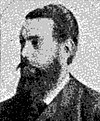Andreas Hallén


Johan Andreas Hallén (22 December 1846 – 11 March 1925) was a Swedish Romantic composer, conductor and music teacher, primarily known for his operas, which were heavily influenced by Richard Wagner’s music dramas. Hallén was born in Gothenburg and died in Stockholm, but the early years of his career and most of his education were in Germany.[1] Like his Norwegian contemporary Edvard Grieg and many other composers the same generation, Hallén frequently evokes the folk music and folk stories of his home country in his compositions. According to the musicologist Axel Helmer, however, "The salient feature of his style [...], and the one which strongly affected contemporary reaction, is its close, almost derivative relationship to German music," especially Wagner.[2] Around 1885, Hallén returned to Sweden and continued to conduct and compose, and in later years taught composition at the Stockholm Conservatory.
Works
Operas
- Harald der Wiking (1881)
- Harald Viking (1884) (Revised and translated version of Harald der Wiking)
- Hexfällan (Witch’s trap) (1896)
- Waldemarsskatten (Valdemar’s Treasure) (1899)
- Valborgsmässa (Walpurgis Night) (1902) (Revised version of Hexfällan)
References
- ^ Helmer, Axel. "Hallén, Andreas". Oxford Music Online. Oxford University Press. Retrieved 8 March 2017.
(b Göteborg, 22 Dec 1846; d Stockholm, 11 March 1925). Swedish conductor, composer, teacher and critic. Between 1866 and 1871 he studied in Leipzig with Reinecke, in Munich with Rheinberger and in Dresden with Rietz. He then returned to Göteborg, where he became conductor of the music society (1872–8); he later taught singing in Berlin (1879–83). Back in Sweden he was conductor of the Philharmonic Society in Stockholm (1885–95) and of the Royal Opera (1892–7), as well as founder and conductor of the South Swedish Philharmonic Society (1902–7). From 1909 to 1919 he taught composition at the Stockholm Conservatory.
- ^ Helmer, Axel. "Hallén, Andreas". Oxford Music Online. Oxford University Press. Retrieved 8 March 2017.
